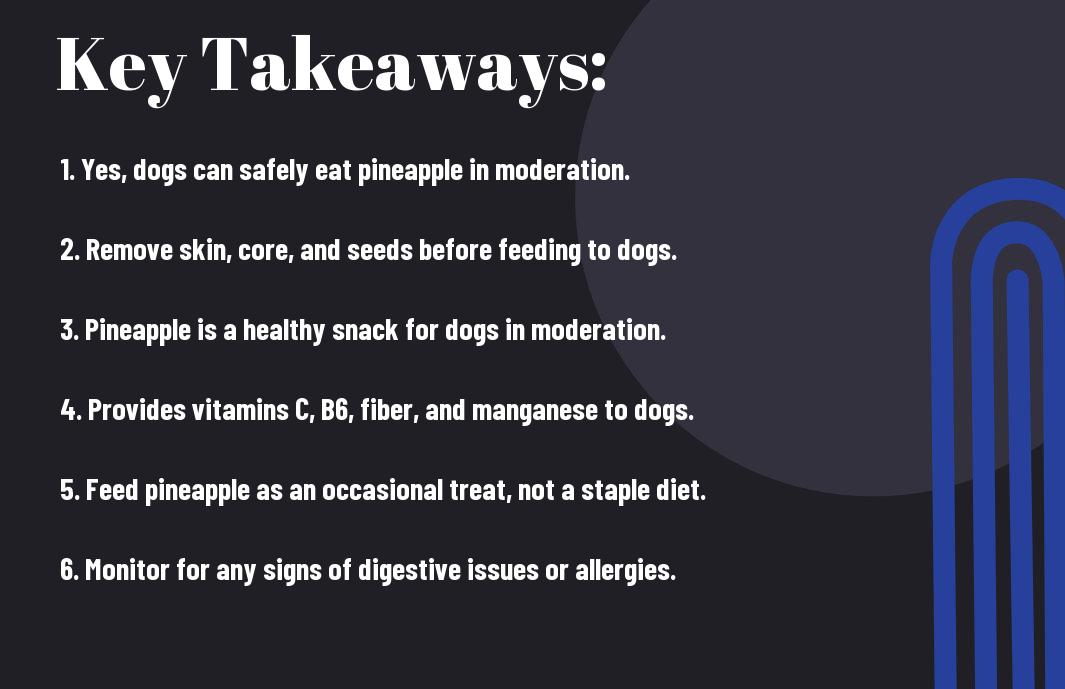Food for thought: Can dogs eat pineapple? Let’s tackle this juicy topic and explore into whether this tropical fruit is a safe and healthy treat for our furry friends. To uncover the truth behind this canine culinary conundrum, we’ll explore the potential benefits and risks of feeding dogs pineapple, shedding light on what pet owners need to know. So, grab a seat and let’s dig into the pineapple debate!
Key Takeaways:
- Dogs can eat pineapple in moderation: Pineapple is safe for dogs to eat as a treat, but it should be given in moderation due to its high sugar content.
- Rich in vitamins and nutrients: Pineapple contains necessary vitamins and minerals like Vitamin C, Vitamin B6, and dietary fiber, which can benefit your dog’s health when given in appropriate amounts.
- Avoid giving the core and skin: While feeding pineapple to your dog, make sure to remove the tough core and spiky outer skin as they can be difficult for your dog to digest and may pose a choking hazard.
The Pineapple Puzzle
A Fruit So Sweet, Yet So Confusing
Sweet yet slightly tangy, pineapple is a tropical fruit loved by many. But when it comes to sharing this delicious treat with our canine companions, things can get a bit confusing.
The Origins of Pineapple as a Dog Treat
Confusing as it may be, the idea of feeding dogs pineapple actually has some interesting origins. It is said that the practice of giving pineapple to dogs originated from South America, where the fruit is plentiful and has long been known for its digestive benefits.
With its natural enzymes and high fiber content, pineapple is believed to aid in digestion and soothe gastrointestinal issues in dogs.
The Nutritional Profile of Pineapple
Even though it may seem like a simple fruit, pineapple packs a powerful nutritional punch. Understanding the necessary vitamins and minerals found in pineapple can shed light on why it can be a healthy treat for your furry friend.
Rich in Vitamins and Minerals
Vitamins such as vitamin C, vitamin A, and vitamin B6 are abundant in pineapple. These vitamins play crucial roles in supporting your dog’s immune system, vision, and overall health. In addition to vitamins, pineapple is also rich in minerals like manganese, which is important for bone health and enzyme activation.
High Water Content: A Blessing or a Curse?
High water content in pineapple can be beneficial for keeping your dog hydrated, especially during hot summer months. However, too much water from pineapple consumption can lead to digestive issues like diarrhea. It’s important to moderate the amount of pineapple you feed your dog to avoid any potential stomach upset.
Content
The Dangers of Feeding Pineapple to Dogs
Choking Hazards: A Real Concern
With its tough exterior and fibrous texture, pineapple can pose a choking hazard to dogs, especially if not cut into small, manageable pieces. The hard, indigestible core of the fruit could also cause obstructions in your dog’s digestive tract if ingested improperly. It’s crucial to ensure that you prepare the pineapple properly before offering it to your furry friend to prevent any potential choking incidents.
Allergic Reactions: A Rare But Possible Scenario
With any new food introduced to your dog’s diet, there is always a risk of allergic reactions. Although rare, some dogs may be allergic to pineapple. Signs of an allergic reaction can include itching, swelling, hives, and gastrointestinal upset. If you notice any of these symptoms after feeding your dog pineapple, it’s vital to discontinue the fruit immediately and consult your veterinarian for further guidance.
Another important factor to consider is that the high sugar content in pineapple can lead to gastrointestinal upset in some dogs, causing symptoms like diarrhea and stomach pain. It’s important to monitor your dog closely after feeding them pineapple for the first time and look out for any signs of discomfort or adverse reactions.
The Benefits of Feeding Pineapple to Dogs
Now let’s examine into why adding pineapple to your dog’s diet can be advantageous. One of the significant benefits of feeding pineapple to dogs is its anti-inflammatory properties, which can be a boon for canine health.
Anti-Inflammatory Properties: A Boon for Canine Health
For dogs dealing with inflammation due to arthritis or other health issues, incorporating pineapple into their diet can help alleviate discomfort. Bromelain, an enzyme found in pineapple, has been shown to reduce swelling and inflammation in both humans and animals. By including pineapple in your dog’s meals, you may help mitigate inflammation and improve their overall well-being.
Digestive Enzymes: Aiding in Nutrient Absorption
Absorption
For dogs with digestive issues or difficulties absorbing nutrients, pineapple can be a valuable addition to their diet. The digestive enzymes in pineapple, such as bromelain, can aid in breaking down proteins and enhancing nutrient absorption in the gut. This can be particularly beneficial for older dogs or those with digestive sensitivities.
Health
Including pineapple in your dog’s diet in moderation can provide them with necessary nutrients and contribute to their overall health and well-being. However, it’s crucial to introduce new foods gradually and consult with your veterinarian to ensure that pineapple is a suitable addition to your dog’s diet.
Preparing Pineapple for Your Dog
Once again, before you start preparing pineapple for your furry friend, it’s vital to understand the dos and don’ts of feeding this fruit to dogs. Check out this informative article on Can Dogs Eat Pineapple? Read Before You Feed to ensure you’re making the right choice for your pet.
Fresh vs. Canned: Which is Better?
Your best bet when offering pineapple to your dog is fresh fruit. Canned pineapple often contains added sugars and preservatives that may be harmful to your furry friend. Opting for fresh pineapple ensures your dog gets all the natural benefits without any unnecessary additives.
Removing the Skin and Core: A Must-Do
Removing the skin and core of the pineapple is crucial before sharing this fruit with your dog. The tough outer skin can be difficult for dogs to digest, while the core poses a choking hazard. By taking the time to properly prepare the pineapple, you can enjoy peace of mind knowing you’re offering a safe and healthy treat to your canine companion.
Plus, by removing the skin and core, you are left with just the sweet, juicy flesh of the pineapple, making it easier for your dog to eat and digest. Do not forget, moderation is key when it comes to treating your dog with pineapple to avoid any digestive issues.
Moderation is Key
Despite the many benefits of feeding pineapple to your canine companion, it’s important to remember that moderation is key. While pineapple can be a healthy and tasty treat for your dog, too much of it can lead to digestive issues such as diarrhea or an upset stomach. As with any new food introduced into your pet’s diet, it’s best to start with small amounts to see how your dog reacts before incorporating it more regularly into their meals.
The Importance of Balancing Treats with Regular Meals
To ensure that your dog is getting a well-balanced diet, it’s vital to balance treats like pineapple with their regular meals. While pineapple can be a healthy snack, it should not replace a complete and balanced diet formulated for your dog’s specific nutritional needs. Remember to consult with your veterinarian to determine the appropriate portion sizes and feeding frequency for your furry friend.
Avoiding Overfeeding: A Recipe for Disaster
Meals should make up the bulk of your dog’s daily caloric intake, with treats like pineapple being given in moderation. Overfeeding your dog, whether it’s with regular meals or snacks, can lead to obesity and a host of health problems. It’s crucial to monitor your dog’s overall caloric intake and ensure that treats are not contributing to excessive weight gain. Always consider the size and activity level of your dog when determining appropriate portion sizes.
For instance, smaller breeds may only require a few small pieces of pineapple as a treat, while larger breeds may be able to handle a bit more. By keeping a close eye on your dog’s diet and exercise routine, you can help prevent the negative consequences of overfeeding and ensure that your furry friend remains happy and healthy.
To wrap up
With this in mind, it is clear that dogs can safely eat pineapple in moderation as a tasty and healthy treat. The article “Can dogs eat pineapple? How to safely feed your pooch…” from USA Today provides valuable insight into the benefits of incorporating this tropical fruit into your dog’s diet while also highlighting the importance of proper preparation and portion control. Remember to always consult with your veterinarian before making any significant changes to your dog’s diet to ensure their health and well-being.
FAQ
Q: Is pineapple safe for dogs to eat?
A: Yes, pineapple is safe for dogs to eat in moderation. It can be a healthy and tasty treat for them.
Q: What are the benefits of feeding pineapple to dogs?
A: Pineapple is a good source of vitamin C, fiber, and antioxidants, which can help improve digestion and boost the immune system in dogs.
Q: How should I serve pineapple to my dog?
A: It is best to serve fresh pineapple to your dog. Remove the tough outer skin and spiky top, then cut it into small bite-sized pieces to prevent choking hazards.
Q: Are there any risks associated with feeding pineapple to dogs?
A: While pineapple is generally safe for dogs, feeding them too much can cause digestive upset due to its high fiber content. Also, some dogs may be allergic to pineapple, so it’s important to monitor their response when introducing it to their diet.
Q: How much pineapple can I feed my dog?
A: As a treat, pineapple can be given to dogs in small amounts. It is recommended to limit the serving size to no more than 10% of your dog’s daily caloric intake to avoid any potential issues.
Are strawberries toxic for dogs
Demystifying Anal Gland Issues in Dogs: Your Comprehensive Guide from the American Kennel Club




